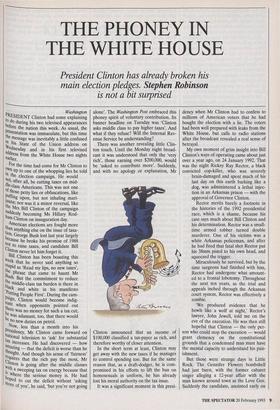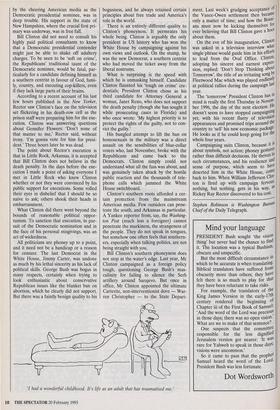THE PHONEY IN THE WHITE HOUSE
President Clinton has already broken his main election pledges. Stephen Robinson
is not a bit surprised
Washington PRESIDENT Clinton had some explaining .t° do during his two televised appearances before the nation this week. As usual, the Presentation was immaculate, but this time the message was inevitably a little confused tn his State of the Union address on Wednesday and in his first televised address from the White House two nights earlier.
For the time had come for Mr Clinton to °. wn up to one of the whopping lies he told In the election campaign. He would not, after all, be cutting taxes on mid- dle-class Americans. This was not one of those petty lies or obfuscations, like Puffing upon, but not inhaling mafi- Juana; nor was it a minor reversal, like the Mrs Bill Clinton of the campaign suddenly becoming Ms Hillary Rod- ham Clinton on inauguration day. American elections are fought more Moan anything else on the issue of taxa- , George Bush lost last year largely because he broke his promise of 1988 not to raise taxes, and candidate Bill Clinton never let him forget it. Bill Clinton has been boasting this Week that he never said anything so sapid as 'Read my lips, no new taxes', the phrase that came to haunt Mr Bush. But the commitment to reduce the middle-class tax burden is there in black and white in his manifesto Putting People First'. During the cam- Paign, Clinton would become indig- nant when opponents pointed out there was no money for such a tax cut; he was adamant, too, that there would be no new duties on petrol. Now, less than a month into his Presidency, Mr Clinton came forward on national television to 'ask' for substantial tax increases. He had discovered — how amazing — that the deficit is worse than he thought. And though his sense of 'fairness' requires that the rich pay the most, Mr Clinton is going after the middle classes with a sweeping tax on energy because that where the serious money is. He had "°Ped to cut the deficit without 'asking ntOre of you', he said, 'but you're not going alone'. The Washington Post embraced this phoney spirit of voluntary contribution. Its banner headline on Tuesday was 'Clinton asks middle class to pay higher taxes'. And what if they refuse? Will the Internal Rev- enue Service be understanding?
There was another revealing little Clin- ton touch. Until the Monday night broad- cast it was understood that only the 'very rich', those earning over $200,000, would be 'asked to contribute more'. Suddenly, and with no apology or explanation, Mr Clinton announced that an income of $100,000 classified a tax-payer as rich, and therefore worthy of closer attention.
In the short term at least, Clinton may get away with the new taxes if he manages to control spending too. But for the same reason that, as a draft-dodger, he is com- promised in his efforts to lift the ban on homosexuals in uniform, he has already lost his moral authority on the tax issue.
It was a significant moment in this presi- dency when Mr Clinton had to confess to millions of American voters that he had bought the election with a lie. The voters had been well prepared with leaks from the White House, but calls to radio stations after the broadcast revealed a real sense of betrayal.
My own moment of grim insight into Bill Clinton's ways of operating came about just over a year ago, on 24 January 1992. That was the night Rickey Ray Rector, a black convicted cop-killer, who was severely brain-damaged and spent much of his last day on this earth barking like a dog, was administered a lethal injec- tion in an Arkansas prison — with the approval of Governor Clinton.
Rector merits barely a footnote in the histories of the 1992 presidential race, which is a shame, because his case says much about Bill Clinton and his determination. Rector was a small- time armed robber turned double murderer. One of his victims was a white Arkansas policeman, and after he had fired that fatal shot Rector put his 38mm pistol to his own head, and squeezed the trigger.
Miraculously he survived, but by the time surgeons had finished with him, Rector had undergone what amount- ed to a frontal lobotomy. Throughout the next ten years, as the trial and appeals inched through the Arkansas court system, Rector was effectively a zombie.
`We produced evidence that he howls like a wolf at night,' Rector's lawyer, John Jewell, told me on the eve of the execution. He was then still hopeful that Clinton — the only per- son who could stop the execution — would grant clemency on the constitutional grounds that a condemned man must have the mental capacity to understand his pun- ishment.
But those were strange days in Little Rock. The Gennifer Flowers bombshell had just burst, with the former cabaret singer alleging a 12-year affair with the man known around town as the Love Gov. Suddenly the candidate, anointed early on by the cheering American media as the Democratic presidential nominee, was in deep trouble. His support in the state of New Hampshire, where the crucial first pri- mary was underway, was in free fall.
Bill Clinton did not need to consult his highly paid political consultants to know that a Democratic presidential contender might just be able to shake off adultery charges. To be seen to be 'soft on crime', the Republicans' traditional taunt of the Democratic nominee, would be fatal, par- ticularly for a candidate defining himself as a southern centrist in favour of God, fami- ly, country, and executing cop-killers, even if they lack large parts of their brains.
According to a recent account of his last few hours published in the New Yorker, Rector saw Clinton's face on the television set flickering in his death-row cell as the prison staff were preparing him for the exe- cution. Clinton was answering questions about Gennifer Flowers: 'Don't none of that matter to me,' Rector said, without irony. 'I'm gonna vote for him for presi- dent.' Three hours later he was dead.
The point about Rector's execution is that in Little Rock, Arkansas, it is accepted that Bill Clinton does not believe in the death penalty. In the days before the exe- cution I made a point of asking everyone I met in Little Rock who knew Clinton whether or not they were convinced by his public support for executions. Some rolled their eyes in disbelief that I should be so naïve to ask; others shook their heads in embarrassment.
What Clinton did there went beyond the bounds of reasonable political oppor- tunism. To sanction that execution, in pur- suit of the Democratic nomination and in the face of his personal misgivings, was an act of wickedness.
All politicians are phoney up to a point, and it need not be a handicap or a reason for censure. The last Democrat in the White House, Jimmy Carter, was undone as much by his lethal sincerity as his lack of political skills. George Bush was bogus in many respects, certainly when trying to look enthusiastic about conservative Republican issues like the blanket ban on abortion, which he clearly did not support. But there was a faintly benign quality to his bogusness, and he always retained certain principles about free trade and America's role in the world.
There is an entirely different quality to Clinton's phoneyness. It permeates his whole being. Clinton is arguably the only president in US history who has won the White House by campaigning against his own views and outlook. On the stump, he was the new Democrat, a southern centrist who had moved the ticket away from the liberal nostrums.
What is surprising is the speed with which he is unmasking himself. Candidate Clinton flaunted his 'tough on crime' cre- dentials; President Clinton chose as his third candidate for Attorney General a woman, Janet Reno, who does not support the death penalty (though she has sought it while prosecuting cases in Florida) and who once wrote: 'My highest priority is to protect the rights of the guilty, not to con- vict the guilty.'
His bungled attempt to lift the ban on homosexuals in the military was a direct assault on the sensibilities of blue-collar voters who, last November, broke with the Republicans and came back to the Democrats. Clinton simply could not understand what all the fuss was about, and was genuinely taken aback by the hostile public reaction and the thousands of tele- phone calls which jammed the White House switchboard.
Clinton's southern roots afforded a cer- tain protection from the mainstream American media. Few outsiders can pene- trate the south, and Arkansas in particular. A Yankee reporter from, say, the Washing- ton Post (much less a foreigner) cannot penetrate the murkiness, the strangeness of the people. They do not speak in tongues, but somehow one often feels that southern- ers, especially when talking politics, are not being straight with you.
Bill Clinton's southern phoneyness does not stop at the water's edge. Last year, Mr Clinton campaigned as a foreign policy tough, questioning George Bush's mas- culinity for failing to silence the Serb artillery around Sarajevo. But once in office, Mr Clinton appointed the ultimate Carterite, non-interventionist dove — War- ren Christopher — to the State Depart- 'I had a wonderful childhood. It's life as an adult that has traumatised me.' ment. Last week's grudging acceptance of the Vance-Owen settlement then became only a matter of time; and how the Bosni- ans must now be kicking themselves for ever believing that Bill Clinton gave a hoot about them. On the eve of his inauguration, Clinton was asked in a television interview what single phrase would guide him in his efforts to lead from the Oval Office. Clinton, adopting his sincere and earnest exPres" sion, replied: 'Don't Stop Thinking about Tomorrow', the title of an irritating song by Fleetwood Mac which was played endlessly at political rallies during the campaign last year. The 'tomorrow' President Clinton has in mind is really the first Thursday in Novem- ber 1996, the day of the next election. fle doesn't seem to have stopped campaigning yet, with his recent flurry of television appearances and promised trips around the country to 'sell' his new economic package• He looks as if he could keep going for the whole four years. Campaigning suits Clinton, because it is about symbols, not action; phoney gestures rather than difficult decisions. He thrives in such circumstances, and his resilience and sense of purpose, which seem to have deserted him in the White House, come back to him. When William Jefferson Clin• ton is fired up with campaign fervour, nothing, but nothing, gets in his way, as Rickey Ray Rector discovered to his cost.
Stephen Robinson is Washington Bureau Chief of the Daily Telegraph.
Mind your language
PRESIDENT Bush sought 'the vision thing' but never had the chance to find it. The locution was a typical Bushisin, obscure and unspecific. But the most difficult circumstance in which to be accurate is when translating• Biblical translators have suffered from obscurity more than others; they have felt there is so much to play for that they have been reluctant to take risks. For example, the translators of the King James Version in the early-17th century rendered the beginning of Chapter iii of the First Book of Samuel: `And the word of the Lord was precious, in those days; there was no open vision. What are we to make of that sentence?
One suspects that the committee responsible for the less dignified Jerusalem version got nearer: 'It was rare for Yahweh to speak in those days; visions were uncommon.'
So it came to pass that the prophet Samuel heard the word of the Lord. President Bush was less fortunate.
Dot Wordsworth



























































 Previous page
Previous page